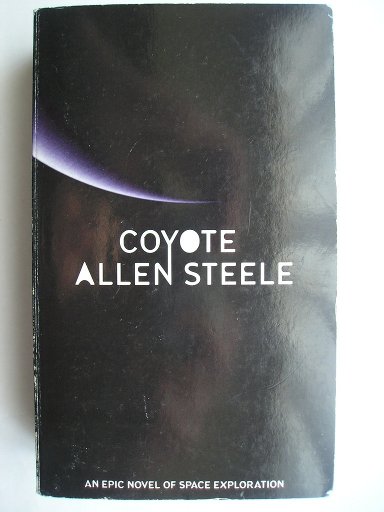
The novel “Coyote” by Allen Steele was published for the first time in 2002 fixing-up some stories published separately between 2001 and 2002 in versions that sometimes a little different. It’s the first novel in the Coyote series.
Coyote is a moon of a gas giant planet type in the system 47 Ursae Majoris, 46 light years from Earth and can support life. In 2070, the regime of the nation built after the fall of the USA decides to send to Coyote the URSS Alabama, a spaceship capable of interstellar travel carrying a crew in suspended animation.
Captain Robert E. Lee was chosen as commander of the Alabama also thanks to the influence of his father in law. Lee is not only contrary to the regime but also organized a plot to seize the USSR Alabama and replace several crew members with other dissidents. Despite an attempt to stop their escape, the starship leaves with the aims of freedom but colonizing Coyote will be far from easy.
In the second half of the ’90s there was a revolution in astronomy when the discovery of the first exoplanets was announced. Today weìre so used to these findings that only the fans are still interested but at that time such discoveries and other deeds such as the mission of the Hubble Space Telescope were big deals.
Recently, the possible discovery of an exomoon orbiting a gas giant was announced. The data must be examined to verify this finding: if confirmed, it would be the first discovery of an exomoon. In that case, that exomoon probably would be too small to have an atmosphere so it couldn’t support life but inevitably I thought about Coyote.
The novel “Coyote” blends well various themes ranging from space adventure of a very classic type to those of social and dystopian science fiction. The basis is the interstellar journey of the starship URSS Alabama to colonize Coyote but in the background there’s the description of a nation that emerged after the collapse of the USA and in 2070 is an authoritarian regime.
The novel suffers a bit for the fact that is the fix-up of some stories. It tells different episodes of the journey of the URSS Alabama from the moment the members of the conspiracy take control of it to the arrival to Coyote and the early stages of its colonization. On the other hand, the various stories complement each other to form a larger story.
The second part of the novel has a more classic tone because it takes up the classical theme of the colonization of another planet, and Coyote is a moon so large as to be considered a planet. Here you can also see naivety and errors that should be absent in modern stories.
For example, it seems that there are no people in the crew with specific skills concerning animal breeding and agriculture so they’re started after limited assessments. Probably Allen Steele didn’t want to dwell on long descriptions of these topics but that part seems rather vague and scarcely planned for such a mission.
A consistency problem is represented for example by Coyote’s seasons. First it’s claimed that the axis of Coyote has practically no inclination but then there are references to the days become shorter, however it’s the inclination of the axis that determines the shortening and lengthening of the days.
The various episodes are told from the point of view of various characters, for the most part in the third person but occasionally in the first person. Inevitably, among the many characters in the novel only a few protagonists are developed, particularly Captain Robert E. Lee and two kids who are part of the crew: Wendy Gunther and Carlos Montero.
Due to its characteristics, “Coyote” is a novel with ups and downs. The stories that form it are very different from each other so different people will like, or dislike, different parts of the novel. This is the first of a series of novels so, despite its length, the story doesn’t have a real ending.
Even with its flaws, I think that “Coyote” is all in all a good novel. If you are interested in the themes included and you’re looking for a book not too demanding you might like it.


Permalink